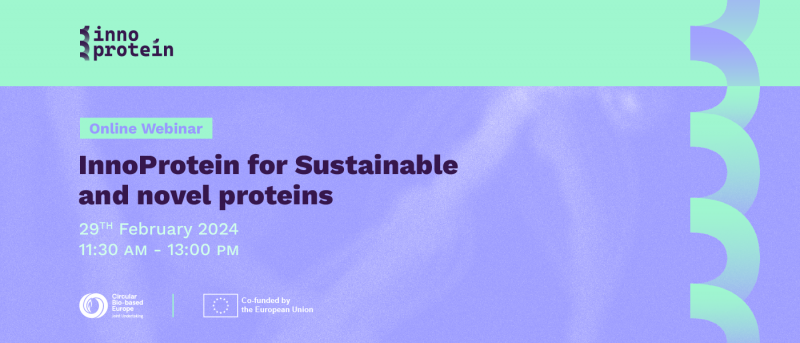WEBINAR – The urgent need for alternative proteins: InnoProtein brings solutions to the table

On February 29th at 11:30 AM CET, the InnoProtein project will host its inaugural webinar to explore the world of alternative proteins. During the webinar, we will delve into the reasons for the necessity of alternative proteins, identify the most promising protein sources, and discuss the regulatory framework that is emerging in this field.
Reserve your spot here: InnoProtein for Sustainable and Novel Proteins – Webinar Tickets, Thu 29 Feb 2024 at 11:30 | Eventbrite
Why Alternative Proteins? The European Protein Gap
InnoProtein project aims to deliver safe, tasty new proteins that can fulfil the food security crisis without compromising the environment.
.Currently 70% of protein-rich crops and 85% of soybeans used for human and animal consumption came from outside the EU territory. By 2050, the global population is estimated to reach 10 billion, making access to sustainable protein crucial to guarantee future food security. However, the European Union is currently heading towards a “protein gap”, as it currently relies heavily on imported protein
To ensure a sufficient supply of nutritious food products, alternative protein sources appear as a sustainable and potentially cheap protein substitute to conventional animal-based and traditional vegetable sources, such as soy products.
The four alternative proteins stream
During the webinar, the InnoProtein partners will discuss and present the potential of four novel protein sources:
Bacteria:
Methylotrophic bacteria, a specific type of microorganisms, possess a remarkable ability to utilize simple carbon compounds like methanol. This unique characteristic enables them to exhibit rapid growth metabolism and achieve high cell densities. As a result, they can efficiently produce high quality proteins and various other valuable bioproducts using renewable resources
Microalgae
Microalgae are an extremely diverse group of microscopic organisms. Biotechnologically, they are a natural source of biomass and nutritious compounds such as polyunsaturated fats and essential aminoacids.
Fungi
Fungi are an excellent source of alternative (vegetarian and vegan) protein because they contain all the essential aminoacids that the body needs, therefore constitute a dedicated novel protein source for human and animal nutrition.
Insects:
Considering their rapid reproduction and high protein extraction rate, insects have emerged as a promising solution for obtaining high-quality protein and valuable byproducts that can be applied as technical additives for feed, food, and health products.
Securing the solution while closing its life cycle.
Given their novel condition, alternative protein sources lack standard procedures to exploit them. In the webinar, experts will also present pertinent frameworks for each of the streams.
Standards play an important role, since they will foresee the ease of sharing and collecting data, together with a constant improvement of the methodologies used to grow and exploit each of the protein sources.
Role of sustainability:
Aware of the environmental emergency, the InnoProtein consortium adopted a zero-waste approach, which means the recovery of residual biomass to further upgrade it into non-food applications.
While participating in the webinar, you´ll get to see how byproducts can be transformed into valuable compounds such as:
Biofuels, clean sources of energy.
Bioplastics, biodegradable cuttlery.
Biostiumlants, plant-growth boosting formulas.


